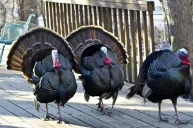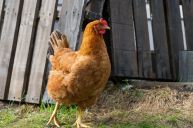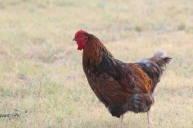The speckled Sussex is a friendly, peaceful backyard bird!
The speckled Sussex has been around since the Victorian period. This breed has a happy, docile temperament and enjoys following its owners around the yard. They are good egg layers and excel at being free-range foragers around their farm or homestead.
Origins Of The Speckled Sussex
The speckled Sussex was initially raised in England's southeastern Kent and Sussex counties for meat. When the Romans invaded Britain in 43 CE, they wrote of a chicken similar in appearance to the speckled Sussex, speculated to be their ancestor. The first recognizable Sussex fowls were part of the first poultry show in 1845 during the so-called "hen fever" in the US and UK during the Victorian period.
Caponized roosters were fattened and sold as big roasters. Other Sussex varieties and Rhode Island Reds were the main breeds that kept Britain supplied with chicken meat and eggs during World War II. During WWII, the speckled Sussex rooster was one of the most sought-after chicken breeds in the United Kingdom. It was described as "good and delicate dining," and it was a standard option for roasting in the United Kingdom and the United States during that time.
Breed Appearance And Standards
The pattern for the speckled Sussex hen was developed in England in 1902. The Poultry Club of Great Britain classified them as a heavy, soft feather breed, while the American Poultry Association recognized the breed in 1914 and classified them as English class breed. Since there are very few breeders, certain lines have had genetic problems, with chicken keepers struggling to find the right balance. Sussex has a bantam range, but they are challenging to obtain.
Each feather has a white tip divided from the mahogany by a black bar with iridescent green speckles. Their wattles, comb, and ear lobes are all red in base color. This heavy breed typically lays brown eggs, and egg color doesn't vary from one hen to another. Egg size is usually large, making them easy to pick up in the morning. The beak is a light brown color. They have white skin, thighs, and feet with four toes. The legs are short and muscular, with wide thighs. They should have a broad, smooth back and a deep, broad chest. This coloration pattern provides the bird with excellent camouflage if they live free-range around a farm or homestead.
Temperament
They are some of the friendliest and most docile chickens and maintain a very even disposition. Speckled Sussex chickens make excellent backyard chickens and foragers. They can bear confinement well, but if permitted to roam free-range, they will thrive, significantly lowering your feed bill and eliminating pests from the yard. Free-ranging Sussex chickens will often follow their owners around the yard. They are also very cold hardy, and can withstand cold temperatures, but dislike heat due to the density of their feathers.
Meat And Egg Production
https://www.instagram.com/p/CB6ZTeRgASy/
Because of their easygoing nature, they are generally at the bottom of the pecking order and can be bullied by bigger, more assertive birds. Speckled Sussex hens are very broody, good layers. They lay 4-5 large, light brown eggs per week on average. They are said to continue egg laying during the winter months, with just a brief break to molt. The speckled Sussex have a brooding personality, but they also set well and make excellent mothers to their baby chicks.
In addition to being good egg layers, the speckled Sussex chicken is a dual-purpose bird as it can also be raised for meat. In terms of maturity, the Sussex variety matures reasonably quickly for a heritage fowl - about 20 weeks or so. The speckled Sussex breed matures a bit slower. When raised as a meat bird, the Sussex weighs in at 7 lb. for hens and 9 lb. for roosters. While the flavor of the meat is excellent, the American market wants a much darker color of meat. The flesh of the speckled Sussex is tender pinkish/white. Still, they make for excellent birds overall. Pick up a straight run of speckled sussex chicks or pullets from your hatchery today.
Share your experiences raising chickens on the Wide Open Pets Facebook page!




